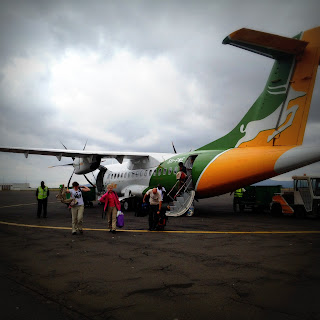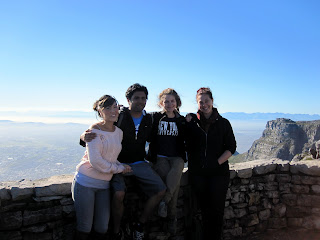N.B.: This is a novel with no pictures. Read at your own risk of boredom!
So, this was the
epitome of a rural Botswana village.
When I walk
towards the traditional round homes, clay plastered and thatch roofed, my shoes
sink into red sand. A curl of smoke
twists from a small wood cooking fire, cordoned off by a twiggy fence.
We’re here to
visit Ratika*, a 17 year-old AIDS orphan, born HIV-positive. Her mother died soon thereafter and the father is nowhere to be found. Andy sees her at the hospital but also makes
special visits every once in a while to her village near Molepolole
(Moh-lee-poh-lo-lee), an hour and a half from Gaborone.
Today, I am lucky
enough to tag along.
The grandmother
who raises Ratika greets me first with a broad, toothless smile that brightens
her face, rough and wrinkled like elephant skin. She grabs my hand in the
signature Botswana handshake and says, “Dumelo” followed by all kinds of chipper
chatter directed to me that I don’t understand.
I do understand
the sharpness in her tone when she yells at the three adorable boys who have popped
out of the fire pit and are chasing the chickens. Except, if you look closely, the one in the
pink pants is a girl. They all have
round, naked heads and pants that hover five inches above shoes out of which
their big toes pop. The boy with
mischief in his eyes begins a game of peek-a-boo with me. No one is certain who’s kids these are.
Finally, Ratika
emerges from her house with a scowl, looking to be about 12. Hers is the only non-traditional house in
sight, and when she slides down the cinderblock wall to rest in the sand, I see
the scarring and hair loss from a bad fungal infection she contracted as a
child.
Ratika is in and
out of school and often sick due to poor adherence to her ARVs, largely because
of drinking. She has failed 1st
and 2nd line treatment and, in Bostwana, 3rd line is basically
nonexistant.
It’s clear though, she’s a
survivor to have made it this far. Other
than a hangover, she looks well.
Andy has brought
her oranges, toilet paper, and Ensure, among other things. The prize gift is a solar cell phone charger.
He probes her, “How
are you feeling?”
Silence.
“Are you hungry?”
A murmur.
“How’s school?”
A dismissive turn
of the head.
“Did you get your
track suit?”
Another murmur.
Andy says getting
her in the morning (it’s about 8:00) can be rough.
In the silence, a
dog—a good looking one with a sweet face—comes over, curls up next to her in
the sun and closes its eyes. This loyal
move strikes me as supportive in the way that only animals can be
sometimes.
The three kids
plop down next to the dog—three ducks in a row—alternately drawing in the sand
and playing peek-a-boo with me. The
grandmother settles on the other side of Ratika, tucking one leg beneath
her. As she gives us updates (Nenguba
translates—though I feel much is lost in translation), she fills the deep cracks
in her hands with Vaseline. We learn
that Ratika wants to go to a neighboring school where her friends are who drink
and disobey their parents.
Ratika sits and
stares, a frowning granite statue.
The grandmother
clucks mightily when Ratika throws the notebook in the sand that Andy has
filled with math problems.
After the
run-down, we split up. It’s really
chilly so we face the sun. The grandmother has made some tea over the fire,
which she pours from a cup onto a little plate and slurps. We cheerily chat about I don’t know what and
Nenguba braids my hair. In this moment,
I close my eyes, and for some reason feel completely content with Nenguba’s
hands in my hair, the sun on my face, and the smoke from the small fire in my
nostrils.
When my eyes blink
open, Andy and Ratika are laughing by the house. She’s just completed all his problems
correctly and there is a new brightness to her whole demeanor.
I hear Andy say, “You’re
great at math.”
Later, I told Andy
he worked some serious magic. He said,
no, the hangover wore off but I know it’s both.
After getting
Ratika’s sizes for new clothes and measuring their door frame for new doors (their
hinges are broken and the wooden doors are disintegrating) we bid the family farewell. I get a handshake from Ratika but the
grandmother embraces me.
“Goodbye,” she
says in English, still holding me. “Thank
you for visiting us.”
This moved
something inside me nearly to tears. I
was an outsider. Stupidly privileged
with nothing to add, no medical expertise, no language. It is I who should be so gracious; my honor
to be there. I hope she understood when
I tried to convey this.
This was my morning.
Back in Andy’s
truck, I immediately fall asleep and am stirred by a full stop. A mile of stopped cars looms ahead, so Nenguba and I jump out and
walk ahead through the dust to see what all the fuss is about. En route, people are cheering, hanging out of
car windows and drinking ample beer out of truck beds.
Then, we reach the culprit: it is Botswana’s
annual off-road race! Vehicles travel
600 miles in two days and, in this very spot, they cross the paved road.
This is clearly
something Botswana gets behind. In a
nation of just 2 million, there must be 1,000 cars perched around this crossing and
quadruple the attendees. Police gingerly let traffic pass. Those
perched in trees announce the crossings first with a shout, then police stop traffic and the whole crowd
goes wild. We see a race dune buggy, a
jeep, and a truck scream across the pavement in a cloud of red dust before Andy
catches up to us and hour later.
Exciting!
In other news,
President George W. Bush is visiting Gaborone on July 5th to promote
PEPFAR’s (the Presidents Emergency Plan for Aids Relief) cervical cancer initiative, which has been a migraine for Andy.
Here are some of
the details that go into this one-day visit.
President Bush,
now a private citizen, charters a 747 from the US and it sits on the pavement
while he tours Zambia for a week. On
this plane, he brings with him 60 plus staff, one, whose sole purpose is to run
around the day of the 5th to ensure there is a particular brand of
toilet paper and soap in each of the restrooms he might use.
There was a three-week battle between the President’s foundation in Texas, Washington D.C., and
the U.S. embassy here regarding taking pictures in the cervical cancer wing of
Gaborone’s hospital, the President’s first visit. Although the Bush team is demanding photographs
with patients, the hospital explicitly forbids all photos. There are reasons. For instance, the cervical cancer wing serves
only HIV-positive women, many of whom, do not disclose their status due to
stigma and domestic violence that ensues.
The Bush team
communicated that the photographer is in the President’s “bubble” and absolutely
cannot leave his side.
The hospital retorted,
fine, but the camera must stay in the car.
Now, the Bush team
is reconsidering whether the photographer is truly an essential part of the
bubble.
On the bright side
for President Bush, next, he is visiting a rural clinic that does allow photos
if there is written consent. Thus, a few
star patients are being preselected to take pictures with the President.
Following this, President
Bush is traveling to a village, just 20 minutes from the city, that has a Peace
Corps volunteer. But, to make this visit
ever the more comfortable for the President, they are transporting the 4 Peace
Corps volunteers from Texas from the far corners of Bostwana to this site for
the day. Isn’t that splendid?
In the past,
President Bush traveled with his bed that needed to be assembled on-site. Now, he merely travels with his pillow. I can’t
make fun of that—I too, have a travel pillow.
But this is just
one day. July 5th.
Think of the resources
that go into this day—the privately chartered 747, the salaries of his 60 plus
staff, and the cost of everyone’s time to debate photographs for three weeks.
What goes into
July 6th?
Then, think of
Ratika.
*Names have been
changed (not President Bush’s).















































